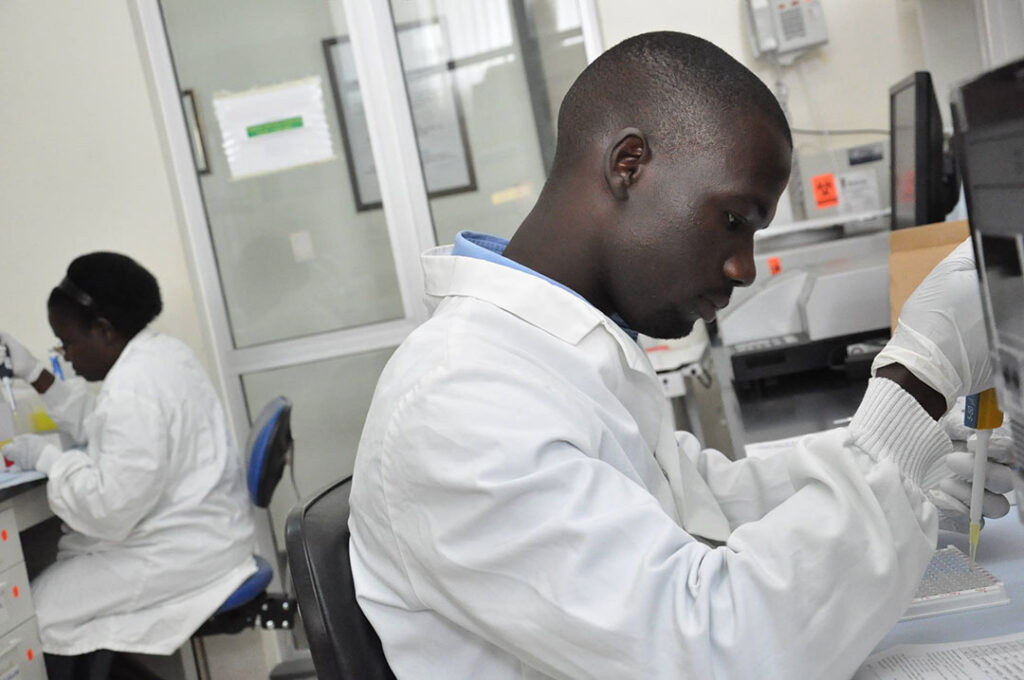ADF STAFF
Ugandans will contribute to the development of a possible COVID-19 treatment when a vaccine trial launches in the country in December.
The Uganda Virus Research Institute (UVRI) will conduct the trial to test a treatment being developed by the United Kingdom’s Imperial College London. The trial will examine the vaccine’s safety and its ability to trigger an immune response in people.
Uganda’s COVID-19 trial is one of 15 underway on the continent.
Participating in vaccine trials ensures African nations a seat at the table for the development and distribution of the final treatment, according to Dr. Matshidiso Moeti, head of the World Health Organization’s (WHO) Africa Regional Office in Brazzaville, Republic of the Congo.
“We know also that when we have the vaccine, it will need to be rolled out at unprecedented speed and scale. Equity must be a central focus of our efforts,” Moeti said at a WHO press conference in July. “Too often African countries have ended up at the back of the queue for new technologies, including vaccines.”
African-based drug trials also help researchers understand how vaccines and other treatments interact with distinct population groups on the continent, according to Dr. Richard Mihigo, coordinator for immunization and vaccine development at the WHO in Brazzaville.
“Testing vaccines on the continent ensures that sufficient data are generated on the safety and efficacy of the most promising vaccine candidates for the African population so they can be confidently rolled out in Africa once approved,” Mihigo told the medical journal The Lancet.
In recent years, Uganda has emerged as an important player in vaccine research and drug trials. The UVRI has played integral roles in developing a vaccine for Ebola and continues to seek a vaccine for HIV. It has 415 clinical trials in process.
But mistrust remains about vaccine trials in Uganda and elsewhere. UVRI director Pontiano Kaleebu said the best way to combat this is through abiding by high ethical standards and sharing information with the public.
“Even with this COVID, as we prepare for vaccines, we are preparing ourselves to communicate with communities where we plan to conduct the studies, answer their questions,” Kaleebu said during the WHO COVID-19 press conference. “I think communities will trust scientists if they provide the right information.”
Kaleebu said he remains optimistic that a vaccine for COVID-19 is within reach, largely because so many people have shown that they can recover from the infection.
“For COVID, because people do recover, it will be easier to correlate recovery with the immune system,” Kaleebu said. “And then you design your vaccine to mimic nature.”
Even as the institute stakes its claim to clinical research on the continent, Africa makes up only 2.5% of its clinical trial participants worldwide. As a result, Africans frequently get access to lifesaving drugs years or decades after they become widely available elsewhere.
“If anything, not enough vaccine trials are being done in Africa,” said Shabir Mahdi, who leads his own COVID-19 vaccine study in South Africa in conjunction with Oxford University in the United Kingdom. He participated in the WHO press conference with Moeti and Kaleebu.
Mahdi, a professor of vaccinology at the University of the Witwatersrand in Johannesburg, South Africa, said his group approached Oxford and asked to be included in its vaccine study.
“It’s critical that we actually understand how these vaccines work in an African context,” Mahdi said.

